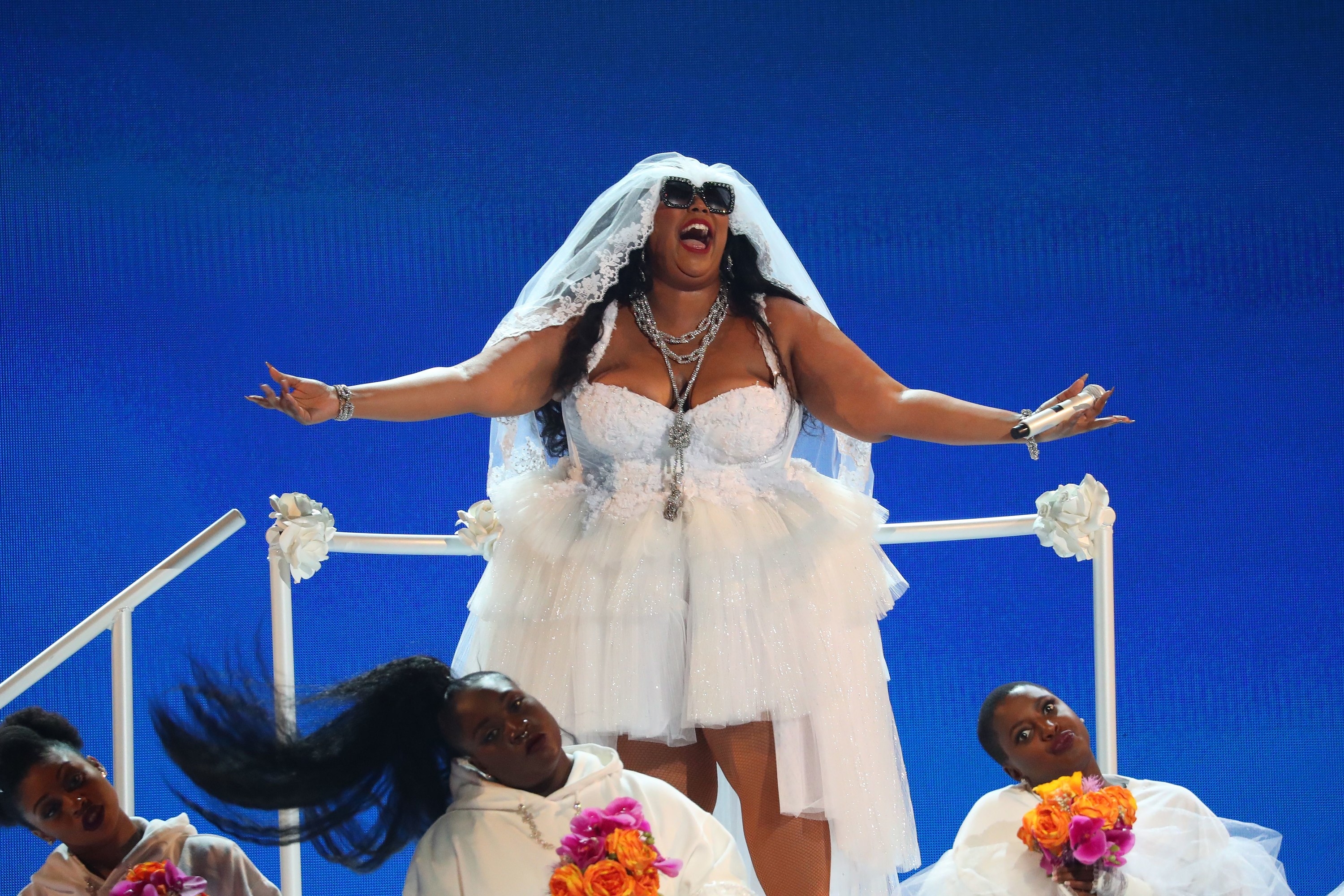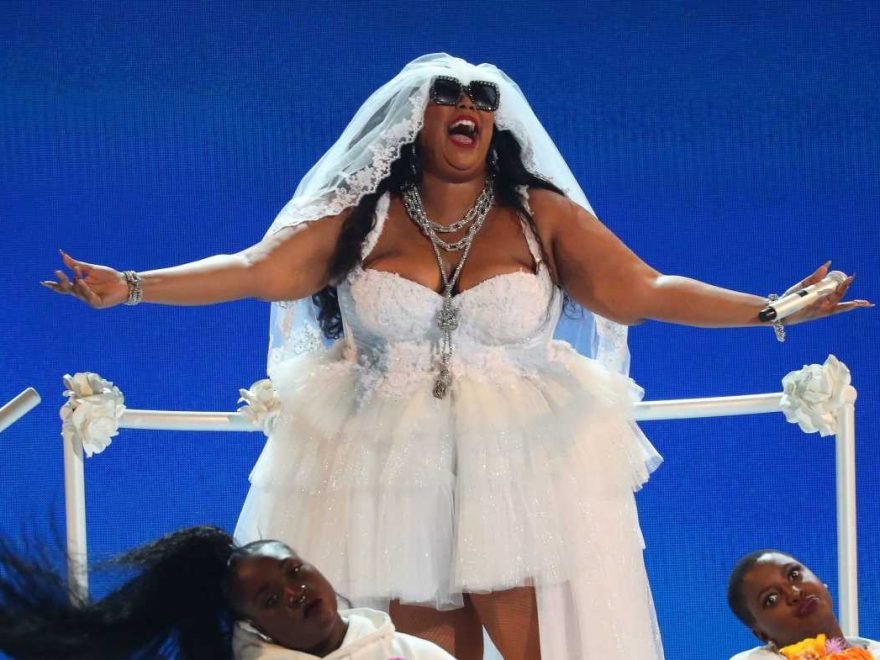
Lizzo performs onstage during the 2019 BET awards at Microsoft Theater in Los Angeles, California on June 23, 2019.
In 1988, Whitney Houston was breaking records left and right. Her sophomore album Whitney, released in 1987, had debuted at No. 1 on the pop charts. Four of the singles from that album had topped the Billboard Hot 100, the first time a woman artist had ever accomplished this feat. Houston was nominated for three Grammys, including Album of the Year (she lost to U2’s Joshua Tree) and she was invited to open the televised ceremony with a performance of “I Wanna Dance With Somebody (Who Loves Me).” The accolades were proof that the commercial success of her debut album, Whitney Houston, wasn’t a fluke. The former teen church choir singer from New Jersey was officially en route to becoming one of the biggest pop stars of the ’80s and of all time.
Just a few weeks after her Grammy performance, however, Houston would receive a much more muted reception at the 2nd annual Soul Train Awards, which had been created by Soul Train founder Don Cornelius to “honor our own” as Dionne Warwick put it to the Los Angeles Times. Houston was nominated for Best Music Video alongside Janet Jackson, Michael Jackson, and Jody Watley; but when the announcer read her name, the crowd, which had broken out into ecstatic cheers for the Jackson siblings, loudly and noticeably booed.
The criticism? “Black disc jockeys have chided her for not having soul and for being too White,” read an Ebony profile of the singer from May 1991. In Living Color famously spoofed her with a “Rhythmless Nation” sketch: “There’s music on my side, which really helps me hide / plus the fact that I cannot really sing helps me do my thing,” warbled Kim Wayans as Houston, before launching into a lackluster running man. (The sketch was funny, sure, but it was also incredibly inaccurate. Yes, Houston couldn’t dance, but she didn’t have to — she could sang! And not to pit two black women against each other, but Whitney could sing Janet under the table. I will gladly die on this hill!)
The criticism really stung Houston. “… don’t say I don’t have soul or what you consider to be ‘Blackness,’” she told Ebony in that same profile. “I know what my color is. I was raised in a Black community with Black people so that has never been a thing with me. Yet, I’ve gotten flak about being a pop success, but doesn’t mean that I’m white….Pop music has never been all-White.”
But for much of Houston’s early career, until she teamed up with black superstar producers like Kenneth “Babyface” Edmonds and veered into R&B with the release of her albums I’m Your Baby Tonight (1990) and especially My Love Is Your Love (1998) — not to mention her starring roles in one of the most quintessentially black movies of the ’90s, Waiting to Exhale — Houston was dogged by these sellout critiques.
Though they are two very different stars at two very different phases of their career, it’s hard not to see the parallels between black criticism of Whitney in the ‘80s and similar accusations made recently against Lizzo, whose single “Truth Hurts” just became the first song by an unaccompanied black woman artist to top the Billboard Hot 100 this year.
The 31-year-old Midwest native, who was born in Michigan but accrued much of her indie fanbase in Minneapolis, has become a lightning rod for conversations about her unabashed corniness and her perceived pandering to the “white gaze.” Reviewers offered cautious praise when her major label debut dropped this year. The Atlantic called her music “a tad mawkish, but nonetheless feel-good.” Meanwhile, a Pitchfork review referred to Lizzo as the Natasha Bedingfield of her generation, which Lizzo first took as an insult before walking it back.
Certainly Lizzo makes music that is shamelessly uplifting. Her songs are pep talks stuffed with witty ripostes: “I just took a DNA test / Turns out I’m a hundred percent that bitch” is bawdier than anything Bedingfield would write, but arguably just as corny.
Honestly, though, so what if she’s cheesy? Lizzo has incredible stage presence. A classically trained flautist, she’s become famous for whipping out her flute, playing a few bars and then twerking. Her live performances on late night shows are set-rattling bangers. She is funny. She is profane. She is sexy.
And yet, she has become the kind of black artist that white people (specifically white gay men and white women) cape for in ways that can feel vaguely suspect. White women’s magazines gush about her breathlessly. The crowds at her shows, as demonstrated by her Instagram photos reveal a wide array of pink hands. Lizzo fans have become synonymous with a certain kind of white person who likes to post selfies with her lyrics as captions and who comment on all of Lizzo’s Instagram posts with “Yassssss” and “WERK” and “KWEEN”— signs of a certain waning black credibility.
Twitter is not an accurate representation of real life, but it’s not not that either, especially for black people who have sparked memes, gotten jobs, and reported crimes on an app that has proven time and time again to not give a fuck about us. And on Black Twitter, the jury on Lizzo is still out. While many stan, others say she makes Disney music, or that she’s just a minstrel act.
Recently, as she tends to do, Azealia Banks decided to weigh in. On Tuesday night, on Instagram (because she’s been banned from Twitter), the once-relevant artist went on a tirade about Lizzo’s penchant for wearing outfits “showing her cellulite,” calling Lizzo a “millennial mammy” who caters to white Americans. And because a few black folks on Twitter cited Banks’ comments to say she had made a few good points, black critics were quick to take Banks and her defenders to task.
“The ‘white gaze’ conversations are fascinating. Truly, it’s impossible for any black artist to have mainstream success without consumption by white people. We’re literally only 13% of the population. We can’t pay for Beyoncé or Drake’s or Kendrick’s success on our own,” tweeted TV writer Rae Sanni.
“So white women are into Lizzo. White men are the majority at most mainstream hip-hop concerts but do they get accused of making music for the white gaze?” tweeted another TV writer (and former BuzzFeed employee), Ira Madison III.
The vitriol directed towards Lizzo feels especially wrong-headed, considering the pains Lizzo has gone to emphasize her blackness in various ways. When she appeared on Essence’s digital May cover, she posted an emotional caption on Instagram about why this cover in particular was so important to her: “This is a big one for me because for so long I felt like my music wasn’t reaching black people and it was breakin my heart. To be an @essence COVERGIRL means this musical medicine I got is finally being heard by EVERYONE.”
Lizzo’s first award show performance was at the BET Awards in June, where she appeared as the topper on a sentient wedding cake, busted out her flute mid performance and twerked hard enough that even Rihanna had to get out of her seat and applaud. And when Lizzo performed at Made in America this past weekend, none other than Beyoncé was there standing in the wings watching her.
Artists have limited control over what kinds of fans they attract. So to accuse Lizzo of pandering to the white gaze, when all she does is her work, is silly and unfair. And whomst among us hasn’t engaged in some corny shit? Beyoncé’s “Brown Skin Girl” is so saccharine it hurts my teeth to listen to it. Half the shit Drake sings these days is hardcore patchouli. Before Rihanna was a savage, she was telling us to shine bright like a diamond. A little bit of cheese is part of the pop long game. And as much as I too long for a new Jazmine Sullivan album, Lizzo is here now, unapologetically fat, unapologetically black, and unapologetically thriving. At least she can take comfort in the fact that these accusations of pandering have been lodged at some of our greatest black artists, from Whitney to Prince. In that sense, she’s in excellent company.●

Tomi Obaro is a senior culture editor for BuzzFeed and is based in New York.
Contact Tomi Obaro at [email protected].
Got a confidential tip? Submit it here.
Source: Read Full Article
